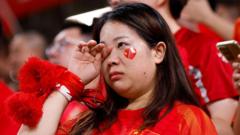China's national football team has hit an all-time low, ranking 90th globally and recently suffering a crushing 7-0 defeat to Japan. This fall from grace follows years of disappointing performances and a wave of corruption allegations that have ensnared players and officials alike, casting a shadow over the future of football in the country.
China's Football Aspirations Crumble Amidst Defeats and Scandals

China's Football Aspirations Crumble Amidst Defeats and Scandals
China’s ambitious plans for football supremacy suffer significant setbacks following catastrophic losses and corruption scandals, jeopardizing the sport's future.
In Saitama, the Chinese team faced a humiliating defeat, with Japan's Takafusa Kubo scoring the final goal, sealing China's worst-ever defeat in a World Cup qualifier. The match was emblematic of a troubled era for Chinese football, which has witnessed a succession of defeats, including losses against countries such as Oman and Hong Kong. Adding to the crisis, recent weeks have seen numerous arrests connected to a corruption probe aimed at tackling match-fixing and gambling within the domestic league.
Once buoyed by lofty ambitions communicated by President Xi Jinping, who envisioned China hosting and winning a World Cup, the footballing landscape has instead devolved into disarray. Critics argue that state control and political appointments have hindered genuine progress, resulting in a lack of grassroots talent development compared to countries with strong football cultures.
Despite these setbacks, the love for football remains prevalent in China, where the women’s national team has achieved greater success and popularity. However, the escalation of professional clubs folding and withdrawing investments has led to a stagnation in the men’s league, exacerbated by the economic downturn post-COVID-19.
The realization of deep-rooted issues has become a nationwide concern, with calls for a shift to an independent governing body akin to those in successful footballing nations. Nevertheless, the entrenched systemic issues present formidable challenges for the future of football in China, with fans grappling with the ongoing national embarrassment as they watch countries like Japan flourish, leaving China behind.
As experts voice their concerns over the structural failures and call for reforms, the path to recovery appears steep and uncertain for Chinese footballers aspiring to redeem their country’s tarnished football reputation.
Once buoyed by lofty ambitions communicated by President Xi Jinping, who envisioned China hosting and winning a World Cup, the footballing landscape has instead devolved into disarray. Critics argue that state control and political appointments have hindered genuine progress, resulting in a lack of grassroots talent development compared to countries with strong football cultures.
Despite these setbacks, the love for football remains prevalent in China, where the women’s national team has achieved greater success and popularity. However, the escalation of professional clubs folding and withdrawing investments has led to a stagnation in the men’s league, exacerbated by the economic downturn post-COVID-19.
The realization of deep-rooted issues has become a nationwide concern, with calls for a shift to an independent governing body akin to those in successful footballing nations. Nevertheless, the entrenched systemic issues present formidable challenges for the future of football in China, with fans grappling with the ongoing national embarrassment as they watch countries like Japan flourish, leaving China behind.
As experts voice their concerns over the structural failures and call for reforms, the path to recovery appears steep and uncertain for Chinese footballers aspiring to redeem their country’s tarnished football reputation.




















